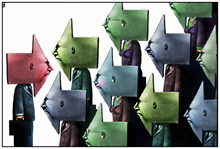by Mohamed El-Erian, PIMCO, via Project Syndicate
NEWPORT BEACH – The international community risks settling for second best on two key issues to be discussed this month at global meetings in Washington, DC: the lingering (if currently somewhat dormant) European debt crisis, and the selection of the World Bank’s next president. It is not too late to change course, but doing so will require the United States and governments in Europe to resist harmful habits, and emerging countries to follow up effectively on recent initiatives.  In the last few days, European leaders, including French President Nicolas Sarkozy and European Central Bank President Mario Draghi, have declared that the worst of the eurozone crisis is over. Others, like French Finance Minister Francois Baroin, have gone even further, claiming that Europe “has done its part,” and that it is now up to other countries to do theirs.
In the last few days, European leaders, including French President Nicolas Sarkozy and European Central Bank President Mario Draghi, have declared that the worst of the eurozone crisis is over. Others, like French Finance Minister Francois Baroin, have gone even further, claiming that Europe “has done its part,” and that it is now up to other countries to do theirs.
These announcements should come as no surprise. Having experienced prolonged turmoil, the eurozone is currently in a period of relative tranquility. The courageous reform measures implemented by Mario Monti, Italy’s technocratic prime minister, have eased immediate concerns that Greek dislocations might tip other European countries – much bigger and harder to rescue – into insolvency. Europe’s decision last week to bolster its internal financial firewalls has reinforced the resulting positive impact on market sentiment. But, as important as these steps are, the recent tranquility has been more borrowed than earned. Since December, the ECB has twice deployed long-term refinancing operations, which provide unlimited three-year financing to banks at 1% interest. This has given the banking system more time to increase capital and improve asset quality. It has also reduced several governments’ financing costs. What it does not do, and is not meant to do, is resolve Europe’s twin problems of too little growth and too much debt.
If it is not careful, Europe risks falling into the trap of trying to shift responsibility for its problems onto others, rather than building on recent progress. That temptation is partly reflected in efforts to press officials from around the world to agree this month to a major increase in the International Monetary Fund’s resources, with emerging economies footing a significant part of the bill. In pivoting from internal to externally-financed firewalls, Europe is pushing a political agenda that is not yet warranted by economic and financial realities. Europeans are about to embark on another round of elections, in both core and peripheral EU countries, as well as a referendum in Ireland. Recent history suggests that these votes are unlikely to favor ruling parties unless they can signal some progress in resolving the crisis.
Copyright © Project Syndicate
Illustration by Paul Lachine











